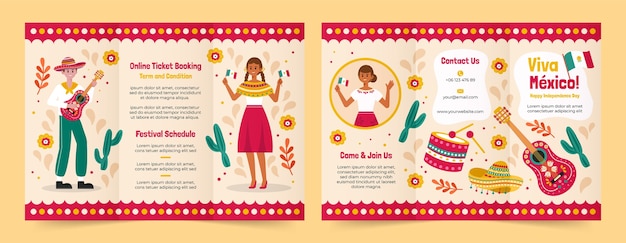Mexican Culture Fascinating Facts

Mexico is a land of vibrant colors and rich cultural heritage.
Mexican culture is a beautiful tapestry woven with indigenous traditions and Spanish influences.
Mariachi music, with its lively rhythms and soulful melodies, is an integral part of Mexican culture.
The Day of the Dead, or Dia de los Muertos, is a unique Mexican tradition that honors deceased loved ones with colorful altars and festivities.
Mexico is famous for its delicious cuisine, including mouthwatering tacos, tamales, and guacamole.
Mexican folk dancing, such as the lively Jarabe Tapatio, is a captivating expression of joy and celebration.
Mexico is home to an incredible array of ancient ruins and archaeological sites, such as Chichen Itza and Teotihuacan.
The Aztecs and Mayans were advanced civilizations that thrived in Mexico long before the arrival of Europeans.
Traditional Mexican handicrafts, such as vibrant textiles and intricate pottery, showcase the country’s artistic talent.
Mexican wrestling, or lucha libre, is not only a competitive sport but also a form of entertainment filled with colorful masks and high-flying acrobatics.
Mexican folklore is rich with mythical figures, like the iconic luchador superhero, El Santo.
Mexico’s national sport is charreria, a traditional horse-riding competition that showcases incredible horsemanship skills.
Mexico’s capital, Mexico City, is one of the most populous cities in the world and is known for its stunning architecture and bustling streets.
Mexican Culture Fascinating Facts part 2
The Mexican Revolution of 1910-1920 was a major turning point in the country’s history, leading to social and political reforms.
Mexican telenovelas, or soap operas, are incredibly popular both within the country and around the world.
The Mexican flag features a powerful emblem of an eagle perched on a cactus with a snake in its beak – a symbol with deep historical and cultural significance.
The vibrant markets of Mexico, such as La Ciudadela and Mercado de Sonora, are a treasure trove of traditional crafts and local delicacies.
Mexico’s colorful and intricate traditional clothing, like the embroidered dresses called huipiles, reflect the country’s diverse regional cultures.
The art of Mexican muralism, popularized by artists like Diego Rivera and David Alfaro Siqueiros, tells powerful stories of Mexican history and society.
Mexican cinema has produced internationally acclaimed directors, actors, and films, including the iconic Like Water for Chocolate and Y Tu Mamá También.
Mexico celebrates a variety of traditional holidays throughout the year, including Independence Day, Cinco de Mayo, and Las Posadas.
Traditional Mexican street food, such as elote (grilled corn) with chili and lime, is a must-try culinary experience.
Mexico has a deep appreciation for music, with genres ranging from mariachi and ranchera to contemporary pop and rock.
Mexican artisans continue to create beautiful handcrafted silver jewelry, showcasing the country’s rich mining traditions.
The Mexican Hat Dance, or Jarabe Tapatío, is a lively and energetic dance that highlights the country’s passion and spirit.
Traditional Mexican piñatas, filled with candy and toys, are popular at birthday parties and other festive occasions.
Mexico boasts a diverse array of ecological wonders, from the stunning beaches of Cancun to the breathtaking Copper Canyon.
Mexican literature, spanning from the colonial period to the present, includes the works of renowned writers like Octavio Paz and Carlos Fuentes.
The famous Mexican artist Frida Kahlo remains an influential figure in the art world, known for her unique style and introspective self-portraits.
Mexico’s charming colonial towns, such as San Miguel de Allende and Guanajuato, offer a glimpse into the country’s colonial past.
The Mexican hat, often associated with mariachi bands, is called a sombrero and is a recognizable symbol of Mexican culture.
The Yucatan Peninsula is home to the magnificent ancient city of Chichen Itza, one of the New Seven Wonders of the World.
Mexican hot chocolate, made with cinnamon and spices, is a beloved traditional beverage enjoyed during the colder months.
The pre-Columbian ball game, known as ulama, was played by the ancient Mayans and is still played in some regions of Mexico today.
The Mexican guitar-like instrument called the jarana is a staple in traditional music, adding a unique and lively sound.
The Mexican holiday Cinco de Mayo commemorates the Mexican army’s victory over French forces in the Battle of Puebla.
Mexican soap operas, or telenovelas, are particularly popular in Latin America and have gained a dedicated following worldwide.
Mexican culture places great importance on family and community, with celebrations and gatherings often centered around loved ones.
The concept of mañana (tomorrow) is deeply embedded in Mexican culture, reflecting a relaxed and laid-back approach to time.
The iconic Mexican artist Diego Rivera is known for his large-scale murals depicting Mexican history and societal struggles.
Mexico is home to a diverse range of ecosystems, including deserts, rainforests, and coastal mangroves.
Mexican folklore is filled with mythical creatures, such as the chupacabra, a legendary creature known for attacking farm animals.
Mexican culture celebrates the quinceañera, a coming-of-age celebration for young women on their fifteenth birthday.
In Mexico, it is customary to greet others with a warm hug or handshake, as a sign of friendliness and respect.
Mexican culture values hard work and perseverance, as epitomized by the phrase si se puede (yes, we can).

